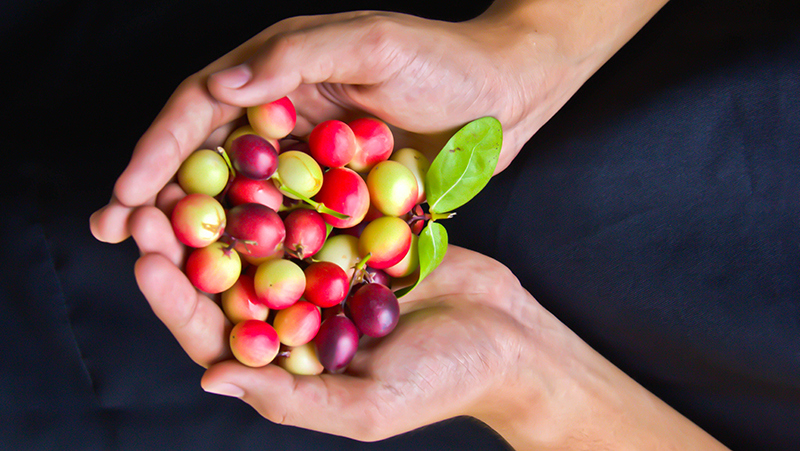Yates Account
Join now
Create a Yates account today!
Sign up to join the Yates Garden Club for monthly e-mails packed with seasonal inspiration, tips for success & exclusive promotions.
Plus if you’re a Garden Club member you can take part in the Yates Growing Community - a blog to share successes, get advice & win prizes in fun challenges along the way!

Forgot password
Enter the email address associated with your account, and we'll email you a new password.

Many of our common foodstuffs come from plants, but often they’re so far removed from their origins, it’s hard to recognise the connection. The tea and coffee we drink every day are good examples.
Tea plants
Camellia sinensis, the tea camellia, is the common source of tea leaves. But this attractive species of camellia doesn’t look anything like the flakes we tip into the teapot. The leaf tips are harvested regularly throughout the growing season and the different types of tea (green, black) are the result of post-harvest treatment.
Although the tea camellia doesn’t have the big, showy flowers found in most garden camellias, it makes a charming garden shrub. It has glossy, mid-green leaves with slightly serrated edges and pleasantly fragrant, small, creamy-white flowers. While it’s fun to harvest your own tea, it’s best to allow the plant to establish itself for the first few years before attempting to pick many of the leaves.
Camellia sinensis does well in the dappled shade beneath larger trees. It will grow in full sun but must be kept well watered through the heat of summer. And, in spite of its long association with warm parts of Sri Lanka and India, the tea camellia, a native of China, is surprisingly cold tolerant.
There are plenty of tea substitutes that can be grown in the garden, too. The New Zealand native manuka (Leptospermum scoparium) is said to have been the first christened ‘tea tree’ by Captain Cook when he infused some of the leaves to make a hot drink.
Lemon myrtle (Backhousia citridora) is an Australian rainforest tree that is grown commercially as a tea.
Other widely gown plants are infused to make herbal teas. Yates seed range includes Borage, Peppermint and Oregano, which are all popular herbal infusions. Growing from seed is a cost-effective way of developing a herbal tea garden.

Coffee
Coffee (Coffea arabica) is much more of a warmth lover than the tea camellia. It won’t cope with cold conditions and can only be grown outdoors in a frost-free climate. Fortunately, coffee makes a successful indoor plant. Coffee’s glossy leaves have an attractive pleated appearance and the perfumed white flowers appear in masses along the stems. The flowers are followed by the coffee ‘cherries’ (pictured), a name that doubtless comes from the bright, cherry red colour of the ripe fruit.
Coffee is extracted from the seeds that are found within the cherries, but processing the seeds into coffee is a fairly tedious job that’s best left to the professionals. It may be better to enjoy your coffee tree for its good looks and regard it simply as a talking point.
In the warmer months, an indoor-grown coffee tree will appreciate some time outside. Move the pot into a shaded outdoor spot, and then gradually expose it to a little more sunshine. Even though you acclimatise it to the sun, it will probably be happiest in a gentle, morning sun position.
Don’t forget that your coffee plant will need much more water outdoors than it did when inside. Feed with some Yates Thrive Indoor Liquid Plant Food in spring.
















Share
Share this article on social media